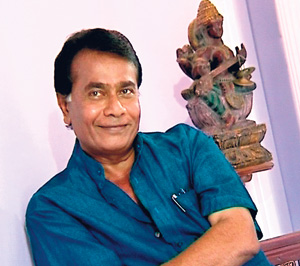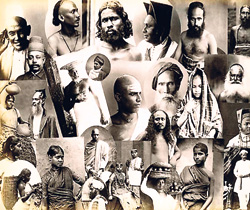Acclaimed playwright and filmmaker Dharmasiri Bandaranayake has returned to direction with a documentary film, ‘Paradise in Tears’, an audio-visual record of Sri Lanka’s history.
 |
| Director
Dharmasiri Bandaranayake |
Produced by Sahajeewana Centre for Coexistence, the documentary series are to be kept as reference library for schools, universities and other educational institutions for research and study purposes.
The first part of the long narrative, a study into the comprehensive history that unfolds in three parts was screened to a limited audience at the National Film Corporation Theatre recently.
Having done his last artistic creation ‘Trojan Kanthawo’, an adaptation of Euripides’ Greek drama ‘The Trojan Women’ for a Sinhala and Tamil audience, a decade ago, Bandaranayake says that working on the film documentary has rekindled his hope to return to cinema.
Here follows an extract of the interview given by the award winning director to the TV Times.
TV Times: What influenced you to take up making this documentary?
Bandaranayake: It was on a request by Sahajeewana Centre for Coexistence which is planning to open a war museum with photos and audio-visual material. For me it was mainly due to the coffee table book by Victor Ivan with some remarkable pictures on the historical events. In fact I was guided to do this film by this book.
TVT: What importance will this documentary have on Sri Lankan society?
Bandaranayake: ‘Paradise in Tears’ is a long narrative that endeavours to examine how Sri Lanka’s great heritage has been developing from an ancient agrarian civilisation, and to explore how it has managed in modern times.
It is a social, economic and political discussion on Sri Lankan history which is filled with blood at different stages.
Before we start this project we collected a lot of material from National Archives and Government Film Unit and also studied similar documentaries done on the American Civil war.
The main purpose of the documentary film would to emphasize that there should be no repetition of some of the tragedies that took place in our history.
TVT: Do you think the documentary film has a sufficient audience in our country?
Bandaranayake: It is sad that our audience could not enjoy and be educated in this powerful medium. Internationally the most popular television programmes are documentaries. But unfortunately our television has denied this opportunity to the audience.
In 1987 during the Peace Accord I did a documentary titled ‘Echoes of War’ as a production of Centre for Ethnic Studies by Dr. Neelan Thiruchelvam and it was never shown on our cinema or television.
But former Indian High Commissioner J. N. Dixit who had seen it, took it to India and showed in ‘Dooradharshan’ on several occasions. This is the tragic state of the art of documentary films in Sri Lanka.
TVT: Having achieved international recognition for your contribution to cinema, what do think about the present cinema industry?
Bandaranayake: Many people talked about how it affected artistes, directors and the industry as a whole. But I believe the biggest tragedy that befell was due to the failure of cinema to impact on the general public.
It was a destruction of cultural man who lived among the ordinary citizen in our country. It is not only the war and the economy but there were other reasons for this sad plight. The educated public servants and the university students who flocked around the stage and the theatre halls were forced to leave them and confine themselves to seeing television at home.
TVT: Lastly would you have any hope of a return to cinema?
Bandaranayake: I did my last films ‘Bhawa Karma’ in 1997 and there was no urge within me to do a film for the past 12 years. However after working on this documentary I feel encouraged to do a film again. Most probably at the end of this year I will start working on a film and it will be a film within a minimum budget.
The background of Bandaranayake
Bandaranyake started direction with ‘Hansa Vilak’ , a film which dealt with facets of a society at odds with itself in 1980. Followed by this he directed ‘Tunveni Yamaya’ (1983) and Suddilage Kathawa (1984) on similar social issues and ‘Bavaduka and Bavakarma’ (1997) which challenged the repressive dogma of Buddhism in Sri Lanka. He is placed among the ten best filmmakers in Sri Lankan cinema.
Bandaranayake as an artist who attempts to connect the socio-political environment with the civil society through art is also well known for his plays like ‘Ekadapathi’, ‘Makarakshaya’, ‘Dawala Bheeshana’, ‘Yakshagamanaya’ and ‘Trojan Women’ which have all dealt with current issues of national and political importance. Bandaranayake was awarded with Bunka Prize by the Japan-Sri Lanka Friendship Cultural Fund in 1996 for his remarkable achievement in theatre and cinema
|


